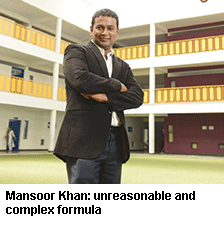 After the recently concluded winter session of the state legislative assembly, Karnataka’s primary and secondary education minister, Tanveer Sait, said notification of amendments to the Karnataka Educational Institutions (Regulations of Certain Fees and Donations) Rules 1999 will be made soon. The amendments will notify a fees formula for the state’s 19,593 private unaided K-12 schools.
After the recently concluded winter session of the state legislative assembly, Karnataka’s primary and secondary education minister, Tanveer Sait, said notification of amendments to the Karnataka Educational Institutions (Regulations of Certain Fees and Donations) Rules 1999 will be made soon. The amendments will notify a fees formula for the state’s 19,593 private unaided K-12 schools.
Despite several efforts to modify the 18-year-old fees formula which was proposed under the Karnataka Education Act (1983), the state government and private schools never agreed on it. According to the proposed rules, maximum tuition fee would be based on the salary expenditure of teaching and non-teaching staff plus 30 percent for contingency and maintenance costs divided by total number of students.
The latest draft suggests differential fees depending on the geographical locations of schools — the 30 percent in the initial formula is amended to 50 percent of non-salary expenditure in rural areas, 60 percent in townships, 75 percent in city corporation areas other than Bangalore and 100 percent in Bruhat Bengaluru Mahanagara Palike (Bangalore municipal corporation) limits. The maximum fee, apart from tuition fees, permitted to be collected (exam, lab, sports, cultural events or remedial classes fees) is not to exceed 5 percent of students’ tuition fees.
Describing the proposed private schools fees regulation proposal as populist, Mansoor Ali Khan, treasurer of the K.K. Educational and Charitable Trust, which runs three Delhi Public Schools in Bangalore and secretary of Managements of Independent CBSE Schools’ Association of Karnataka that has 130 member schools, says the state government’s new fees formula is unreasonable and too complex. “Parents choose private schools for their children after they are convinced of its infrastructure, qualifications of teachers, standing in media rankings etc and sign an agreement to pay the prescribed fees. What right does the government have to interfere with this bilateral contract? If the government insists on interfering, it should simplify the process and cap the annual fee increase to 10-12 percent to which the association is agreeable,” says Khan.
While the Associated Managements of Primary and Secondary Schools, Karnataka (KAMS), which has a membership of 4,000 schools, mostly private budget schools for low income households, has grudgingly agreed to unwarranted government interference with their autonomy, it wants a more rational fees formula. “Ideally, the government should refrain from interfering in private schools’ affairs. But if it insists on doing so, instead of harassing us with complex fee structures, it should devise a scientific formula. The best solution is for private schools to declare their expenditure and fix tuition fees within a permissible surplus of 10-15 percent of the expenditure which can be used for further development of schools,” says D. Shashi Kumar, general secretary of KAMS.
The 300-members Karnataka ICSE Schools’ Association echoes a similar sentiment. “It’s unfair to legislate a common fee structure when there is no uniformity in infrastructure, curriculum or quality of teachers among schools. The state government should take into consideration all these factors if it wants to regulate fees, an idea it mooted almost two decades ago but has not been accepted because it is unrealistic,” says B. Gayethri Devi, secretary of the association and principal of Little Flower Public School, Bangalore.
Recommending a new methodology to determine fees chargeable by private schools, Dr. A. S. Seetharamu, former professor of education at the Institute of Social and Economic Change (ISEC), Bangalore says: “A uniform fee for all schools is illogical as the facilities provided in schools vary. Instead, private school managements should collectively create slabs for facilities provided — teacher-pupil ratio, maximum student-class ratio, toilets, playground, ramps, auditorium, admin area, garden etc — and award a total score. Depending on total score, schools should be allowed to charge fees within a prescribed range. Private schools should take the initiative to build a slabs structure and allow their associations to recommend reasonable fees every year,” says Seetharamu.
While the government has maintained that the objective of the proposed fees formula is to enhance transparency, openness and objectivity in collection of fees in private schools, it’s obviously clueless about how to legislate it. “We had received several objections from different quarters when the draft rules were formed. While we are yet to look into them, we assure all stakeholders that they will be carefully examined before the rules are formed,” says P. Zafar, commissioner, department of public instruction.
Sruthy Susan Ullas (Bangalore)